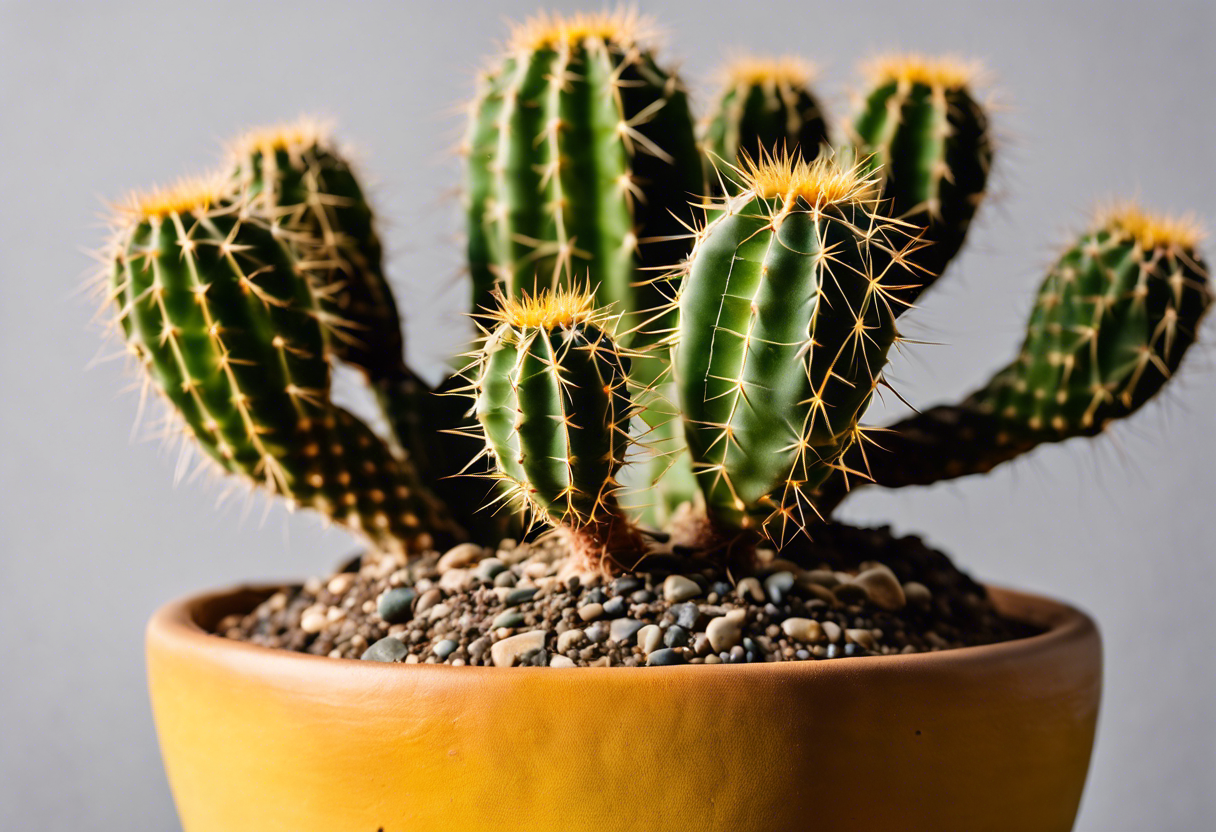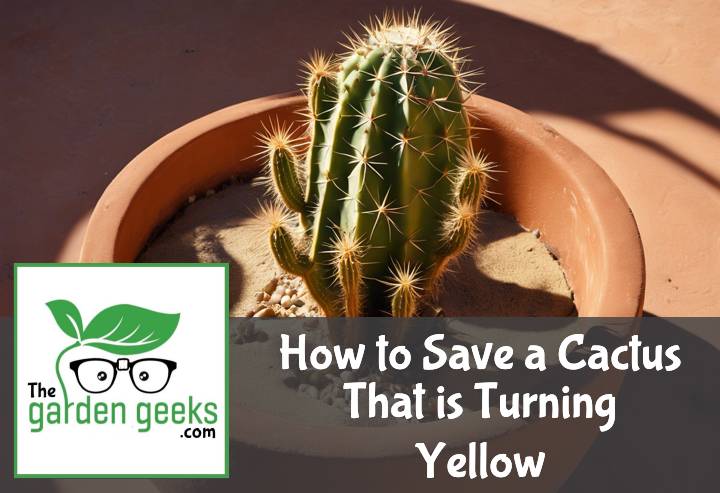Ever had that heart-sinking moment when you noticed your beloved cactus turning a sickly shade of yellow? Trust me, I’ve been there. It’s like watching your favorite character in a TV show get written off. But don’t fret! There are ways on How to Save a Cactus That is Turning Yellow.
In this blog, we’ll dive into the nitty-gritty of what causes our prickly pals to turn yellow and how we can nurse them back to health. So buckle up, plant parents! Let’s embark on this journey of cacti rescue together. Keep reading about How to Save a Cactus That is Turning Yellow!
Key Takeaways
- A yellowing cactus may be due to overwatering, insufficient light, or a nutrient deficiency.
- To save it, first identify the cause. If overwatered, allow the soil to dry out completely before watering again.
- If it’s due to lack of light, gradually increase its exposure to sunlight.
- For nutrient deficiencies, use a balanced cactus fertilizer.
- In severe cases where rot has set in, you may need to cut off the affected parts and propagate a new plant from healthy tissue.

Understanding Why Cacti Turn Yellow
When your cactus starts turning yellow, it’s a cry for help. The common culprits are overwatering, insufficient light, and poor drainage or soil quality. Each of these factors can cause your prickly friend to lose its vibrant green hue.
The Role of Overwatering
Overwatering is like forcing your cactus to wear soggy socks – uncomfortable and unhealthy! An overwatered cactus often turns yellow as a distress signal. You might notice the plant becoming squishy or bloated. This is because too much water makes it hard for the cactus to breathe and absorb nutrients properly.
The effects of overwatering on cacti can be severe. It may lead to root rot, which is pretty much the equivalent of a plant heart attack. So remember, when it comes to watering needs of a cactus, less is more!
Impact of Insufficient Light
Just like us sun-loving humans, cacti need their fair share of rays too! Insufficient light can make your cactus turn yellow. It’s like trying to run a car without enough fuel – it just won’t work well!
Signs that your spiky buddy isn’t getting enough light include slow growth and dull coloration. So if you want a happy, healthy plant, make sure you’re meeting its cactus light requirements.
Effects of Poor Drainage and Soil Quality
Imagine standing in mud all day – not fun right? Well, that’s how your cactus feels with poor drainage and subpar soil quality! These conditions can cause root rot leading to a yellowing cactus.
Improving soil for healthy cacti isn’t rocket science though! Adding sand or perlite can improve drainage while organic matter boosts nutrient content. Remember folks, when learning how to save a cactus that is turning yellow, good soil and drainage are key!
Identifying Signs of a Yellowing Cactus

When it comes to cactus health signs, one of the most alarming is a yellowing cactus. But how do you know if your prickly pal is just going through a phase or if it’s time to learn how to save a cactus that is turning yellow? Let’s dive into some common yellowing cactus symptoms.
Changes in Color and Texture
First up, let’s talk about color and texture. If your cactus has shifted from its usual vibrant green to a sickly yellow, that’s a clear sign something’s up. This could be due to overwatering or lack of proper sunlight.
Now, onto texture. A healthy cactus should feel firm to the touch, not soft or mushy. If you notice any texture variations in cacti, like squishiness or wrinkling, it might be time for some plant doctoring.
Presence of Mold or Pests
Another culprit behind your cactus’ new yellow wardrobe could be mold or pests. These uninvited guests can cause serious damage and lead to discoloration.
If you spot fuzzy white patches on your plant, that’s likely mold. On the other hand, tiny bugs crawling around are probably pests causing havoc on your poor cacti.
Unusual Growth Patterns
Lastly, keep an eye out for unusual growth patterns as they can also indicate an unhealthy plant. If your cacti start growing sideways or develop lumpy growths, it may be trying to tell you something isn’t right.
Remember, understanding these signs is the first step in figuring out how to save a cactus that is turning yellow. So keep those peepers peeled for any changes in your prickly pals!

Steps to Save a Yellowing Cactus
So, your cactus is turning yellow and you’re wondering how to save a cactus that is turning yellow. Well, don’t fret! With some simple cactus care tips, you can revive your yellowing cactus in no time. The key lies in adjusting watering practices, modifying light exposure, and improving drainage and soil conditions.
Adjusting Watering Practices
If you’ve noticed your cactus turning yellow, it could be due to overwatering or underwatering. Yes, both extremes can cause trouble! Overwatered cactus symptoms include a soft, mushy feel and discoloration. On the other hand, an underwatered cactus might look shriveled with signs of wilting.
The trick is to find the optimal balance. Your optimal cactus watering schedule should involve allowing the soil to dry out completely between waterings. This prevents overwatering in cacti. And if you’ve been underwatering? Well, it’s time to show your prickly friend some more love!
Modifying Light Exposure
Another culprit behind a yellowing cactus could be incorrect light exposure. Cacti are sun-lovers but too much of anything isn’t good! Excessive sunlight in cacti can lead to sunburns (yes, plants get them too!) causing them to turn yellow.
On the flip side, insufficient light can also stress your plant out leading to discoloration. So how do we strike a balance? If your plant is indoors, try adjusting indoor lighting for cacti by moving it closer or further from the window based on its needs.
For outdoor plants? A little shade during peak sunlight hours might just do the trick!
Improving Drainage and Soil Conditions
Last but not least let’s talk about drainage and soil conditions. Poor drainage can lead to waterlogging, and trust me, cacti are not fans of soggy feet! So how do you improve drainage for potted plants? Easy peasy! Add some perlite or sand to your soil mix.
Speaking of soil, the right type is crucial. A suitable soil mix for succulents/cacti should be well-draining and nutrient-rich. And remember, no matter how tempting it might be to repot your plant in a giant pot, stick to a size that’s just right. Too big a pot can lead to waterlogging too. Now go on, save that yellowing cactus!
Preventive Measures for Cactus Yellowing
Preventing cactus yellowing is a key part of healthy cactus maintenance. It’s all about getting the basics right – choosing the correct pot and soil, understanding how to water your prickly friend, and ensuring it gets enough light.
Choosing the Right Pot and Soil
The first step in preventing your cactus from turning yellow is selecting the right pot and soil. The best pots for cacti are those with good drainage. This prevents water from pooling at the bottom, which can lead to root rot and a sickly yellow color.
Next up is soil. An ideal cactus soil mix is one that’s well-draining too. A mix of sand, peat moss, and perlite usually does the trick. So remember folks, preventing yellowing starts with correct potting!
Understanding Proper Watering Techniques
Watering – it’s a tricky business! Too much or too little can turn your green buddy into a yellow mess. So what’s the optimal watering schedule? Well, it depends on several factors like climate, season, and size of your cacti.
Overwatering is often the culprit behind a yellowing cactus. But don’t swing to the other extreme either! Underwatered cacti can also turn yellow as they start to dry out from within.
Ensuring Adequate Light Exposure
Finally, let’s talk about light exposure. Just like Goldilocks’ porridge, it needs to be just right! Too much sun can scorch your plant causing it to turn yellowish-brown while insufficient light can result in a pale-yellow color.
Ideal light conditions for cacti vary depending on species but generally speaking, most prefer bright but indirect sunlight. So keep an eye out for signs of light stress in your spiky pal! Remember folks – How to Save a Cactus That is Turning Yellow often starts with prevention!

To Wrap Up
In the same way you’d nurse a goldfish back to health, you’ve now got the know-how to breathe life into your cactus. Remember, hydration and light are key! For more detailed information on How to Save a Cactus That is Turning Yellow, click on the link.
So go ahead, don your gardening gloves and bring that prickly buddy back from the brink! After all, even a cactus deserves a second chance at being lush and green.


